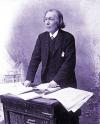'Twas on a Monday morning, and in the year of 1884,
That a fire broke out in Bailie Bradford's store,
Which contained bales of jute and large quantities of waste,
Which the brave firemen ran to extinguish in great haste.
They left their wives that morning without any dread,
Never thinking, at the burning pile, they would be killed dead
By the falling of the rickety and insecure walls;
When I think of it, kind Christians, my heart it appals!
Because it has caused widows and their families to shed briny tears,
For there hasn't been such a destructive fire for many years;
Whereby four brave firemen have perished in the fire,
And for better fathers or husbands no family could desire.
'Twas about five o'clock in the morning the fire did break out,
While one of the workmen was inspecting the premises round about--
Luckily before any one had begun their work for the day--
So he instantly gave the alarm without delay.
At that time only a few persons were gathered on the spot,
But in a few minutes some hundreds were got,
Who came flying in all directions, and in great dismay;
So they help'd to put out the fire without delay.
But the spreading flames, within the second flats, soon began to appear,
Which filled the spectators' hearts with sympathy and fear,
Lest any one should lose their life in the merciless fire,
When they saw it bursting out and ascending higher and higher.
Captain Ramsay, of the Dundee Fire Brigade, was the first to arrive,
And under his directions the men seemed all alive,
For they did their work heroically, with all their might and main,
In the midst of blinding smoke and the burning flame.
As soon as the catastrophe came to be known,
The words, Fire! Fire! from every mouth were blown;
And a cry of despair rang out on the morning air,
When they saw the burning pile with its red fiery glare.
While a dense cloud of smoke seemed to darken the sky,
And the red glaring flame ascended up on high,
Which made the scene appear weird-like around;
While from the spectators was heard a murmuring sound.
But the brave firemen did their duty manfully to the last,
And plied the water on the burning pile, copiously and fast;
But in a moment, without warning, the front wall gave way,
Which filled the people's hearts with horror and dismay:
Because four brave firemen were killed instantaneously on the spot,
Which by the spectators will never be forgot;
While the Fire Fiend laughingly did hiss and roar,
As he viewed their mangled bodies. with the debris covered o'er.
But in the midst of dust and fire they did their duty well,
Aye! in the midst of a shower of bricks falling on them pell-mell,
Until they were compelled to let the water-hose go;
While the blood from their bruised heads and arms did flow.
But brave James Fyffe held on to the hose until the last,
And when found in the debris, the people stood aghast.
When they saw him lying dead, with the hose in his hand,
Their tears for him they couldn't check nor yet command.
Oh, heaven! I must confess it was no joke
To see them struggling in the midst of suffocating smoke,
Each man struggling hard, no doubt, to save his life,
When he thought of his dear children and his wife.
But still the merciless flame shot up higher and higher;
Oh, God! it is terrible and cruel to perish by fire;
Alas! it was saddening and fearful to behold,
When I think of it, kind Christians, it makes my blood run cold.
What makes the death of Fyffe the more distressing,
He was going to be the groomsman at his sister's bridal dressing,
Who was going to be married the next day;
But, alas! the brave hero's life was taken away.
But accidents will happen by land and by sea,
Therefore, to save ourselves from accidents, we needn't try to flee,
For whatsoever God has ordained will come to pass;
For instance, ye may be killed by a stone or a piece of glass.
I hope the Lord will provide for the widows in their distress,
For they are to be pitied, I really must confess;
And I hope the public of Dundee will lend them a helping hand;
To help the widows and the fatherless is God's command.






